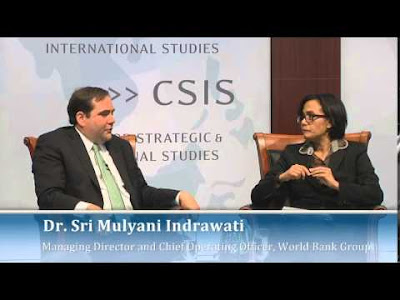View from IMF – Interview with Sri Mulyani Indrawati, Finance Minister, Indonesia
The interview was conducted by The Banker (The Financial Times), 7-9
October 2016.
--------------------------------------------------------------------------------------------
1) So, obviously you were
appointed this year, this new appointment also followed the revision of the
2016 budget and that also involved a revision downwards of both the government
expenditures and revenues. And from [..] say that in previous months in a year
there was almost an over and optimistic view of the state finances. What would
you say to that in light also on the revision of the budget?
Well I took the job two months ago, and that means
that the Indonesian fiscally year is the same calendar year, meaning that we’ve
already finished almost six months, so we entering the August which is the
eighth month, so seventh of it, the eighth month of the year. And we see all
the revenue collection in the past three years in Indonesian budget is always
underachieved what is already targeted in the budget law. So I took
[deliberately] to look at what went wrong, what was behind all the maybe
miscalculation, and of course we can easily identify in the sense that the
commodity price, very weak export, or global trade affecting directly Indonesia
as the commodity producers so you see that the mining sector all [has been in]
negative growth, export and import [are in] negative growth. So that kind of
thing that definitely will affect the revenue side coming from mining,
commodities and the trade activity. We look at all the risk and then we
recalculate and what is the more realistic revenue that we are going to be
collected even the only five months left.
So we discuss and I look at all the underlining data
and they come with the 20.018 trillion rupiahs which is I think that is the
correction which is quite steep considering that we are only [having] five
months left. So what is gonna be then the scenario to [soft lend] this kind of
revenue short. I think we look at the spending side and we see that there is
ability to still trimming down the spending without sacrificing the priority of
building infrastructure, poverty reduction and addressing the issue of inequality
in Indonesia.
2) And where will the cuts in
public spending be in terms of the sectors, where would the change happen?
Well, basically it
is not in the sector but activity, because it is across ministerial but it will
then affect those spending which is considered not really aligned-well with the
objective of the priority for example like the trip or the convention or
meeting spending which we think that that can be still create a more efficiency
room without sacrificing. Or if it is related to some of the infrastructure
capital spending, we are deciding to lengthen the spending. So we are not
really cutting, but we are stretching. So if original project design is going
to finish by December, we can actually lengthen into additional six months. So
it will affect our budget in 2017, but it will not affect the momentum of
growth that we try to maintain in this moment.
3) So, to people who potentially
worry for some points who [..] infrastructure spending if that might be
affected it wouldn’t necessarily be cut, but maybe a lengthening or looking at
[..]
Yes, that’s what we
discuss with all what you call it the sectoral industries, the public world,
transportation, housing, all those things which agriculture especially on the infrastructure
related to irrigation, we said that they are going to be able to lengthen their
project execution so it’s not going to be affected by saying that “I am going
to cut and that’s why the project will be abandoned”.
4) In terms of boosting revenues, obviously there
has been the news of this tax amnesty program which obviously will have
potentially beneficial effects, what about [..] argue however that’s to have a
more sustainable long term boost of government revenues there needs to be a
wider reform in terms of tax in Indonesia, and especially to broaden the tax
base. What are you looking to do in that [front]?
Well,
the tax amnesty aiming to off course creating an opportunity for all the
Indonesian tax payers who in the past is not complying fully the tax. Some of
them maybe have paying tax but not fully disclosed, others maybe even [..] not
paying tax. So this tax amnesty law providing the opportunity as the rights for
them, tax payers to participate by disclosing more accurately their income,
their asset, then they are going to pay according to the timeline in this the
first three months, the [..] is 2 percent, second three months is gonna be 3
percent, and the last three months, this is the nine months program is gonna be
5 percent.
Off course with that the implication not only
just that we are aiming for capital inflow of those people who can repatriate
because if you decide not to repatriate, the rate that you have to pay is doubling
than if you are going to repatriate. So, there is an intention of repatriating
more asset or income. But most importantly it’s actually for Indonesia to have
a much more accurately [..] because people, tax payers, feel that this is the
opportunity for me, to comply, with such a very low fine, and you are going to
be freed from the administrative fine or consequence as well as the criminal
charge for the tax, only. So we are encourag[ing] all tax payers to participate
in this, in order for them to be able to then complying the tax. We are aiming
for then the new information which is more reflecting the accurate both in [..]
or wealth or asset of both individual or corporation and with that, it will
then reflect the much more solid robust accurate new database for us.
5)
And that would help in terms of on
a long term basis increase the tax payers so that would be your and objective,
really that different objective [is that]?
Definitely. Because, if you look at in Indonesia with
the tax ratio which is below 12%, and if you look at within the three months
with around 380 thousand people participating, it’s generating 7.4 billion
fine, or around almost 300 trillion asset disclosure, I think that is really
showing that a lot is actually hiding or not being disclosed truly by our tax
payer. I think that’s then require the most important part on the government,
that is; if they are going to disclose and willing to participate, can we make
sure that the tax department and our tax official is going to be able to
collect tax in a professional way, it’s not harassing, it’s not committing to
the corruption, and so on. So the issue about the tax reform is gonna be, is
now becoming very very very important for us to do. And that’s exactly now
priority. So we are planning to change the law, we are going to do many of the
reform within the director general of taxation, whether this is really the
structure, governance, the conduct, and [..]
6) It has to be a
[motivational] approach because it involves the difference [..]
Yes, it’s very important because the bottom line is
that we want not only just collecting the information but building trust. This
is the trust building between tax payer and the government in order for us to
create a new page in the life of the Indonesian people.
[Well thank you very much for joining us and good luck
with your government madam Minister, thank you very much].
Link: Click here to see the video
Link: Click here to see the video



Blackjack and Casino | Dr.CMD
ReplyDeleteThe 대구광역 출장샵 Blackjack side bet is just like a typical table game 여수 출장안마 of 문경 출장안마 a traditional casino. You are given a total 고양 출장안마 of 40 cards, and the dealer will 강릉 출장안마